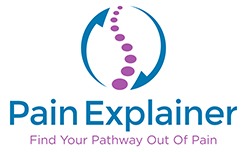Medications
Several types of medications are available that can help treat chronic pain. Here are a few examples:
- Over-the-counter pain relievers, including acetaminophen (Tylenol) or nonsteroidal anti-inflammatory drugs (NSAIDs) such as aspirin (Bufferin) or ibuprofen (Advil).
- Opioid pain relievers, including morphine (MS Contin), codeine, and hydrocodone (Tussigon)
- Adjuvant analgesics, such as antidepressants and anticonvulsants
Before taking any meds, make sure you’re sure.
Getting an accurate diagnosis that understands the true cause of chronic pain allows your doctor to match tissue damage with the medication best suited for controlling that specific type of pain.
And, while narcotic opioids have their place and are often necessary, there are many more options to consider for treating chronic pain.
- Anti-inflammatory
- Muscle Relaxers
- Local Anesthetics & Neurotoxins
- Vasoactive medication
- Epidural Medication
Anti-inflammatory drugs are very common and available over the counter. They include NSAIDs, COX inhibitors, and aspirin. They’re used to treat acute pain including rheumatoid arthritis, osteoarthritis, herniated disc, and many more. While being highly effective, long-term or high dosages can cause serious gastrointestinal problems such as gastritis and bleeding ulcers.
Muscle relaxers are used to treat secondary muscle spasms, post-operative spasms, and acute injuries where muscle tissue is damaged. They work centrally on the glycine receptors and peripherally on the GABA receptors at the spinal cord level.
These are creams or patches often available over the counter like Icy Hot, Lidoderm Patch, lidocaine, and capsaicin. They cause a temporary loss of feeling in the area they are applied to directly. They’re used for muscle strains, arthritis, joint pain, backaches, and sprains.
Vasoactive medications are used to treat migraines, cluster headaches, CRPS II, and Raynaud’s disease. Imitrex is best known for its breakthrough in migraine and cluster headache treatment. Clonidine is known for treating high blood pressure but can also be formulated to treat ADHD and cancer pain.
When we think of epidurals, we tend to think of it in terms of easing the pain of childbirth. But there are other uses including surgery and managing some types of chronic pain including herniated disc, spinal stenosis, and pinched nerves or other pain radiating from the spine. These epidural injections are different from the surgical counterparts and use different medications in lower dosages to reduce pain and inflammation in the back, neck, arms, or legs. There is now an implantable pump for treating chronic pain at the spine. This is a form of epidural.
Anti-convulsant medication is primarily used to control nerve pain, neuropathic pain, peripheral neuropathy, trigeminal neuralgia, and post-herpetic pain these drugs prevent the cascade of protein synthesis.
improves sleep, relieves depression, and works on pain by blocking encephalin hydrolyzing enzymes and increasing enkephalins.
Anti-psychotics create a blockade after the synapse to stop dopamine transmission. In addition to the anti-anxiety and psychological applications, they are used to effectively treat neuropathic pain and post-herpetic pain.
Benzodiazepines, sometimes called “benzos” are anti-anxiety medications. The most commonly known are valium and Xanax. Anti-anxiety medication is used before and after surgery to relax the patient. It can also treat muscle spasm. The downsides are they are often abused and can be addictive. Even short-term use can impair cognitive abilities.
Narcotics are also called opioid pain relievers. They are only used for pain that is severe, typically acute pain that is not helped by other types of painkillers. Opioids are less useful in treating chronic pain and neuropathic pain. As we all know, opioids can be abused, they are addictive, and addiction can be deadly. Narcotics have their place and their purpose, but it is important to know there are other options for managing pain.
Cannabidiol (CBD) is a type of cannabinoid, a chemical found naturally in cannabis (marijuana and hemp) plants. CBD does not cause the “high” feeling often associated with cannabis. CBD can offer an alternative for people who have chronic pain and rely on medications, such as opioids, that can be habit-forming and cause more side effects. While The research on CBD products and pain management has been promising, there aren’t any FDA-approved, nonprescription CBD products, and they are not regulated for purity and dosage like other medications. Please refer to our special section on treating various types of pain with CBD.
